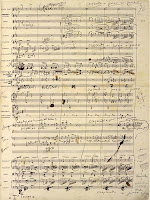Jack Reacher, by Joe Kraemer-6/10
 You know, this one surprised me! Joe Kraemer's a newcomer on the major Hollywood composing scene-this is the first "blockbuster" film he's worked on, and I have to say, it's definitely an acceptable debut. I'm rating it 6 out of 10 because nothing really stood out to me as fantastically brilliant, but I definitely liked things about it. I appreciated his use of strings to drive his music forward and to form rich full chords. The main theme is reminiscent of a Hans Zimmer theme, with low brass, timpani, and fast moving strings. My favorite tracks are Main Title, Helen's Story, and Suite From Jack Reacher (which you can listen to on Spotify). Purchasing Suggestion? Buy the tracks you like-99 cents on iTunes!
You know, this one surprised me! Joe Kraemer's a newcomer on the major Hollywood composing scene-this is the first "blockbuster" film he's worked on, and I have to say, it's definitely an acceptable debut. I'm rating it 6 out of 10 because nothing really stood out to me as fantastically brilliant, but I definitely liked things about it. I appreciated his use of strings to drive his music forward and to form rich full chords. The main theme is reminiscent of a Hans Zimmer theme, with low brass, timpani, and fast moving strings. My favorite tracks are Main Title, Helen's Story, and Suite From Jack Reacher (which you can listen to on Spotify). Purchasing Suggestion? Buy the tracks you like-99 cents on iTunes! Silver Linings Playbook, by Danny Elfman-4/10
Eh. I wasn't really impressed with this one at all. I was actually really surprised to learn that Danny Elfman wrote it, since it sounds almost nothing like any of his past work. In the past, he's tended to make more symphonic sounding scores. In this score, the main instruments are piano, xylophone, and guitar. All of the tracks sounded similar to me, with the same three note patterns repeating over and over again, so I'm actually tempted to rate it lower. It seems like just another romantic comedy score, except for one thing-He used a small chorus of voices to sing his main themes. Interesting choice-Not bad or good necessarily, just different. Purchasing suggestion? I personally didn't like it, so I wouldn't say this one is worth your money. Listen to it on Spotify or something while working or studying. It's unobtrusive background music, but nothing extraordinary. It actually makes me want to see the movie because maybe the acting (which I've heard is excellent) brings more life to the music.
And here's the January scores! Some of these scores have been released already, but the films themselves will be widely released in January, so I'll talk about them when I get back from my trip. I can't wait to listen to this music. You know, my favorite thing about this blog so far is that I absolutely HAVE to listen to new music so I get to discover new composers and hear new things from the ones I know and love. For example, Fernando Velázquez has only worked on Spanish films in the past, and The Impossible is his first major film. I'm looking forward to hearing his work. I'm also excited about the new score from Alexandre Desplat, one of my favorite composers of all time!
 |
| Zero Dark Thirty, by Alexandre Desplat |
 |
| Gangster Squad, by Steve Jablonsky |
 |
| Promised Land, by Danny Elfman |
 |
| The Impossible, by Fernando Velázquez |
Keep your eye out for these scores and listen to the ones I reviewed-please let me know what you think of them! I'd love to hear your thoughts. I'll see you in two weeks after I get back from my adventure! Have a Happy New Year!

















